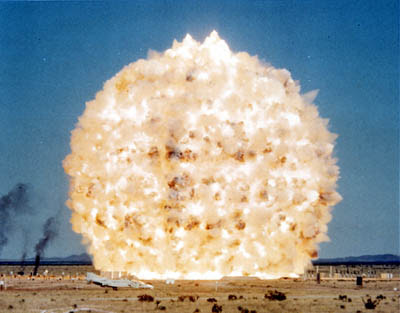
A recent statement in North Korea's main newspaper Rodong Sinmun is potentially interesting for what it reveals about their nuclear strategy.
The north Koreans were responding, in typically bellicose fashion, to the US announcement that it was extending its 'nuclear umbrella' to cover South Korea. Short exempts of the North Korean article can be found all over the web, but when scanning the news on the subject quickly, one relatively short article I found
from a fairly obscure source included enough of the North Korean statement to potentially reveal something interesting about their nuclear strategy. Virtually everyone mentioned the "fire shower of nuclear retaliation", but what most of the articles leave out the following words "all over South Korea."
from a fairly obscure source included enough of the North Korean statement to potentially reveal something interesting about their nuclear strategy. Virtually everyone mentioned the "fire shower of nuclear retaliation", but what most of the articles leave out the following words "all over South Korea."
This statement is a fairly strong indication that nuclear weapon targeting in North Korea definitely includes South Korea of course, but this may well indicate that their nuclear targeting may be focused MOSTLY on South Korea, rather than on South Korean allies like the US or Japan.

Fireball from Minor Scale test immediately after detonation. This was a conventional (non-nuclear) test using only high explosives, and it was above, rather than below ground, but the scale is similar to the latest (2009) North Korean test (yield estemated by the Bulletin of the Atomic Scientists). Note the F-4 Phantom aircraft in the foreground for scale.We have to realize that North Korea targeting the South cannot be regarded as a completely foregone conclusion, because the North regards the South as part of their own nation, and fallout from any such strike would most certainly affect them.
Now the North Korean military and government are composed of very hard men, and it is unsurprising that they would be willing to accept the damage, but they are also a nation with a strong propaganda focus as well, and the possibility of being nuked by the North certainly has the possibility of alienating otherwise sympathetic South Koreans.
The sword of propaganda is double-edged in this case, because the possibility of nuclear war also might encourage South Koreans to make additional concessions to the North, but even so, it is doubtful that the North would risk the negative consequences unless they meant what they said. The North Korean ideology is more patriotic and focused on uniting the nation than it is communist and committed to international socialism, and such a strategy would not fit well with an idle threat to nuke your "own" people and land.
 North Koria's Ballistic missiles "RODONG"(=NODONG), "TAEPODONG-1" and "TAEPODONG-2"
North Koria's Ballistic missiles "RODONG"(=NODONG), "TAEPODONG-1" and "TAEPODONG-2"The REASON that this strategy would be adopted is most likely, technical. Even though North Korea has nuclear weapons, it most likely lacks the ability to place them on ICBM's (missiles). Considering the level (technical or numerical) of North Korean air-power, they could not rely on bomber delivery to far off locations, as the US Strategic Air Command did in the 1950's. It is fairly likely however, that a bomb could be dropped on the South, right across the border.
While technical limitations are likely to have been the most decisive, it is also likely the strategy is based in no small part on the idea that a limited, rather than total, nuclear war scenario is the most desirable. Communist nuclear thinking around the globe never truly embraced mutually assured destruction, and it would not seem especially wise for North Korea to be an exception, at least so long as North Korea lacks nuclear parity (technically unlikely). In the event of a war breaking out on the Korean peninsula, were the North to be pushed to use a nuke locally, the chances that international intervention (especially by China or Russia) would force a truce, would logically be higher, than if San Diego, Maui, or Tokyo were to be vitrified.
Thus the most likely scenario is that North Korean weapons are first, last-ditch solutions to a lost war, and also coming a close second, a deterrent to nuclear attack, which would be most likely to occur if North Korea was WINNING a war with the South, and looked likely to take over the entire nation.
To some degree, this should be reassuring to Americans, Japanese, or other US allies, but it is also very clear that reducing hostilities with North Korea is desirable. Long-extended hostilities will tend to tilt North Korean nuclear strategy further and further towards retaliation; bringing the war TO hated enemies, rather than resorting to targeting that nearly attacks oneself.
To some degree, this should be reassuring to Americans, Japanese, or other US allies, but it is also very clear that reducing hostilities with North Korea is desirable. Long-extended hostilities will tend to tilt North Korean nuclear strategy further and further towards retaliation; bringing the war TO hated enemies, rather than resorting to targeting that nearly attacks oneself.




